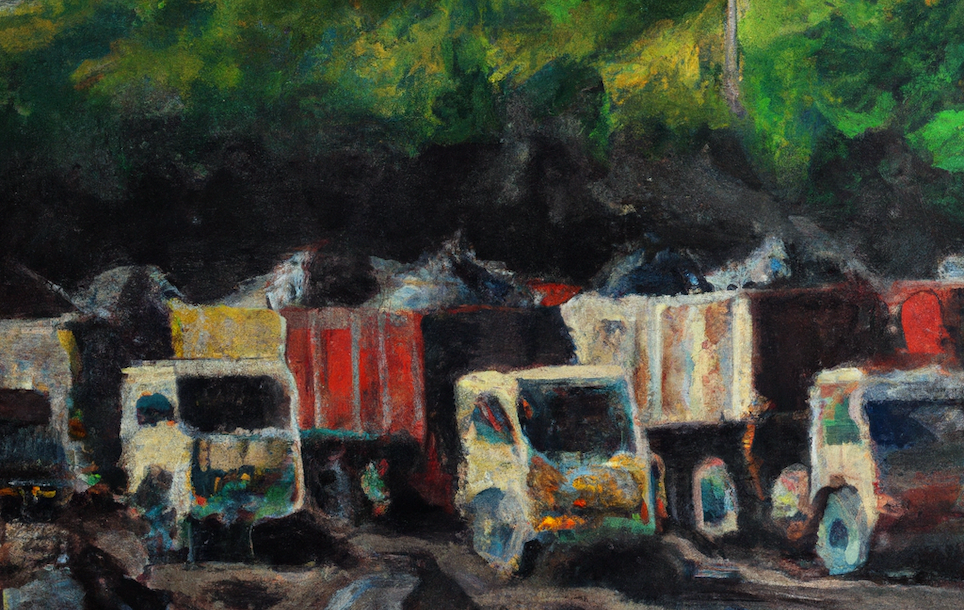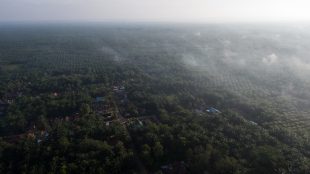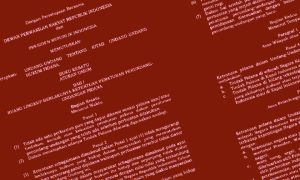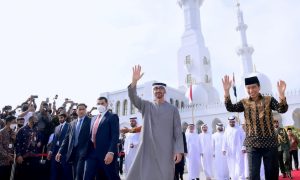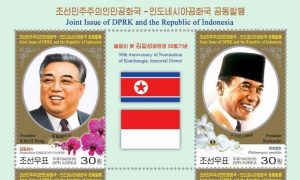Indonesia’s capital of Jakarta is notorious for being among the cities with the worst traffic congestion in the world. Yet the traffic horror there is nothing compared to that in the Sumatran province of Jambi, at least for the past few years. In Jakarta, peak hour gridlock normally lasts a few hours: in Jambi, however, traffic jams can take days, trapping thousands of vehicles in gridlock stretching for tens of kilometres.
The vehicles clogging Jambi’s roads are not fancy cars like in the streets of Jakarta, but dusty, diesel-powered trucks overloaded with coal. Blessed—or cursed—with almost 2 billion tonnes of coal reserves, the fifth largest of any province in Indonesia, Jambi has not only attracted mining investment but also tens of thousands of coal trucks from nearby provinces. The trucks use public roads to transport coal from multiple, scattered mining sites in the province’s inner regions to the port of Talang Duku in the east.
It has not been lost on local communities that the traffic mess became acute after 2020, when Jakarta’s attempts to recentralise governance of the mining sector came into effect through a revised Coal and Minerals Mining Law and the controversial—and partially unconstitutional—Omnibus Law on Job Creation. Both laws aimed to remove provincial governments’ authority to issue mining permits as previously regulated in the 2009 Coal and Minerals Mining Law.
Palm oil companies can act with impunity because of corporate–state collusion and a lack of organised resistance.
Power, illegality and impunity in Indonesia’s plantation zone
The decentralisation that followed the end of the New Order in 1998 paved the way for local oligarchies to take regional Indonesia’s natural riches, changing the status quo of a sector which used to be the domain of the national oligarchy during the Suharto years. This period was marked by a flourishing of patronage politics, in which local politicians built clientelist links with local economic elites who financed their candidacies in local elections in exchange for mining concessions. Numerous local leaders have been caught by Indonesia’s Corruption Eradication Commission (KPK) in mining-related corruption cases.
The stated goal of this recentralisation process, as stated in the 2020 mining law, is “to improve the effectivity and value-added” of the mining sector. This, however, seems to be not a sole reason, as the mining sector is tightly connected to oligarchic forces connected to the central government. Regardless of the motivations for it, one of the effects of the recentralisation has been to make it difficult, if not impossible, for local governments to offer meaningful solutions to pressing mining-related issues—as Jambi’s highway traffic disaster illustrates.
Jambi and its complicated coal-related problems
On the one hand, under Article 91 of the 2020 mining law coal mining companies are mandated to use designated “mining roads” in “the course of undertaking mining enterprises”. But on the other hand, utilising public roads for transporting coal is not explicitly forbidden either. This ambiguity creates a loophole that benefits mining corporations; what’s more, the omnibus law that effected amendments to this mining legislation in 2020 does not require companies to obtain an environmental impact assessment (AMDAL) to start operation, making it easier for coal companies to begin activities without taking environmental and social impacts seriously.
In the wake of the mining recentralisation scheme, traffic congestion caused by coal trucks has become a daily occurrence on Jambi’s main roads. A traffic jam in early March 2023 lasted 28 hours, resulting in patients dying in trapped ambulances, village kids left unable to go to school, and inter-regional traders seeing their vegetables and fish spoil en route. This is not to mention the damage done by coal trucks to Jambi’s roads, an issue which has lately gained national notoriety.
This never happened before 2020, the year Jakarta finalised its recentralisation of mining governance. But because of the ambiguity of current regulations, it is difficult to determine who is truly responsible for the post-2020 traffic chaos and its impacts on public safety and infrastructure. Jakarta has refused to fix Jambi’s damaged roads, while Jambi’s governor has come under intense pressure from constituents, some of whom have filed a lawsuit against him and other local officials over their handling of the issue.
The damage to public roads has put a strain on the provincial budget, pushing the provincial government to pour tens of billion rupiah into the construction and repair of special mining roads. The Indonesian House of Representatives (DPR)’s Commission V, responsible for transport policy, has noted that at 1.2 trillion rupiah ($120 million), the estimated cost to rehabilitate Jambi’s roads is double the revenue the provincial government gains every year from the coal sector.
Part of the problem is the incentives of coal truck drivers, who are employed on a freelance basis and without job protections. They are paid based on tonnage scheme: the more coal they transport, the more money they will earn. As a consequence, most if not all drivers are forced to carry coal far above the maximum legal limit, endangering themselves, their trucks, and other road users. Their presence at the forefront of the traffic crisis has made them scapegoats, leading to numerous conflicts between them and the locals living alongside public roads.
Toothless provincial government
In the opinion of Jambi’s governor, these complex problems are caused by Jakarta’s “recklessness” in issuing mining permits without getting local administrations involved. Before the 2020 takeover of mining regulation by the central government, the number of coal trucks on the road was far lower than that of today.
In addition, even though the coal sector had been notorious for clientelism and political patronage, Jambi’s provincial government had fairly strict regulations to deal with potential problems. Three provincial regulations issued in 2012, 2013 and 2015 outlined clear and specific guidelines on which roads coal trucks must and must not use, sanctions for coal companies who violate regulations, and the obligation of regents (bupati) in relation to mitigating the impacts of coal trucking in their regions. The use of rivers for transporting coal was also clearly defined.
While still far from perfect in terms of implementation, it is undeniable that these locally made regulations have far more complete mitigation plans than those made in Jakarta, which partly explains why acute traffic jams never happened before 2020. Before recentralisation, truck loads were regularly weighed at Jambi’s weigh stations to make sure that they complied with the rules. This, however, is no longer the case because coal oligarchs know that local leaders are toothless, while Jakarta is too far away to see their wrongdoing, let alone give punishment.
Previously when problems arose with the industry, a governor or a regent could cancel mining permits. In 2015, one regency in Jambi, Batanghari, revoked 60 out of 95 coal mining permits in operation. Now, however, Jambi’s governor can only offer short-term remedies, such as ordering temporary halts to trucking coal. There have been no deterrent sanctions from the governor, as he has no power to issue any that are backed with the force of legislation.
In an effort to discipline the industry Jambi’s governor has written to the national Ministry of Energy and Mineral Resources to request a temporary ban on transporting coal on many public roads in the province, but this will be subject to a long bureaucratic process and a long wait for the ministry to respond and make a decision. In the mean time, as if to emphasise the governor’s powerless position, Jambi’s police force has on several occasions announced that it will attempt to enforce temporary halts on coal traffic.
With the skyrocketing prices of coal in the international market it is unlikely that Jakarta will suspend coal mining in Jambi’s mining sites, although the DPR’s Commission V has backed local Jambi leaders’ calls to do so. The Commission has voiced its concern about what has been happening in Jambi, but given the timing of their response this appears to be merely a political gimmick ahead of the February 2024 elections. The traffic problems having occurred since 2020, while their concern was only voiced just recently. Furthermore, their “pressure” was only exhibited during a public hearing with the provincial government, without serious follow up. Likewise, the recent visit to Jambi by the DPR’s Commission VII, which oversees mining policy, similar gave the impression of lip service. It is impossible both commissions V and VII did not know the powerless position of the governor as they were responsible for making laws that paved the way for recentralisation.
Commit to democracy, not recentralisation
It is true that decentralisation of the mining sector bred clientelism and patronage politics. But recentralising its governance has proven to be not a wise solution either. It not only gives rise to social and environmental problems like the chaos on Jambi’s roads, but also may not entirely wipe out clientelism and patronage politics. Instead, it has likely switched the practice from regional Indonesia to Jakarta, just like during Suharto’s centralised regime.
Furthermore, recentralisation creates confused lines of democratic accountability in the eyes of Jambi’s people, in whose minds decentralisation remains the status quo. To demand change they have to pressure their local leaders. Similarly, the latter are bound by a social contract with their constituents and know the consequence if they fail to meet the demand. The five-year term is their trial and will be evaluated in the ballot box should they fail to deliver. This makes the previous scheme of coal management in Jambi more “responsive” to people’s demands, even though, once again, it was far from ideal. Recentralisation has also emboldened coal oligarchs’ bargaining position, as they know exactly that local leaders do not have the power to respond to people’s demands to hold them accountable. This is likely the reason why they ignored the Jambi’s governor’s invitation to discuss the mess their business created because they are fully aware that their stakeholders are in Jakarta, not Jambi.
What Jakarta should have done and should do is to improve checks and balances in local democracy and strengthen rule of law. The root to clientelism and patronage politics is the high price of direct local elections and the weak law enforcement. Fixing these will uproot the problems. A commitment to strengthening public institutions, not opting for recentralisation, is needed so that problems relating to dirty politics, corruption in the mining sector, and law enforcement can be effectively mitigated. Yet sadly, what has been occurring in the past few years is just the opposite: elites have hijacked vital public institutions, resulting in the decline of Indonesia’s democracy.
 Facebook
Facebook  Twitter
Twitter  Soundcloud
Soundcloud  Youtube
Youtube  Rss
Rss 